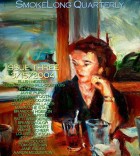You are really adept at the micro stories. How do you approach the length of a story when you are writing?
First off, thanks for the compliment. I began writing with an AOL writing group that gives weekly subjects and has weekly contests for stories under 250 words. In fact, I still write with them when I can. I just got used to thinking in terms of a specific scene or moment in time or character epiphany or humorous insight. I think maybe the reason I enjoy writing these kinds of stories has to do with my short attention span… now, what was I talking about?
I noticed in one of your bios you joked about spending too much time on the computer. How much of your day/night is spent in writing?
Writing, or on the computer thinking about writing? Two very different things. I go to the computer when I wake up in the morning and I stay on it most of the day. (I allow myself some time to garden, exercise or go food shopping.) But I write for maybe two or three hours. The rest of the time I’m answering e-mails or playing computer Scrabble. But, I’m thinking about what I’m writing. Really, I am. Just not consciously. Often, I stop playing suddenly because an idea hits me or a sentence or a way of working out a problem I’m having with a story. It’s as if part of my brain keeps thinking about writing while the other part does something else. And I feel compelled to be near the computer while that’s happening. At least that’s what I tell myself. It may just be an excuse for keeping my lazy butt in a chair. However, I always stop writing when my wife comes home from work. I’m as compulsive about not letting my writing addiction interfere with the time I spend with my wife as I am about letting writing dominate my day.
How has your teaching career affected your writing?
I think I’m a good editor of my work because I spent so many years editing students’ writing. I edited a newsletter of student writing that came out every few months. My job, along with selecting good writing, was to edit, sometimes long essays to short ones, in order to publish as many students as possible before they left our two-year college. That was great experience for writing, especially short pieces. I also taught literature, so I spent a lot of time reading and writing good fiction and poetry, and thinking about what makes them good.
One of my favorite pieces of yours, a nonfiction work titled “To Hell With Twilight,” was nominated for a Pushcart Prize in 2002. What was that process like, and do you write much in the way of nonfiction?
Actually, the piece nominated for a Pushcart was “A Graveyard Meditation,” also nonfiction. For both stories, I started thinking in terms of writing fiction but the situation and characters were too close to real life. The next thing I knew, I was writing nonfiction. In “Meditation,” what started as a fictional piece about a man my age (late 50s) thinking about his dead father, turned into me meditating on my relationship with my dad. Old memories suppressed for decades came roaring in. In “Twilight,” I thought about what a wonderful fictional character my father-in-law would make. But instead of fictionalizing him, I simply recounted some of the old memories.
I guess as a writer, it’s clear I don’t really have much control over my writing. I start, and I go where the words and images take me. Frankly, it’s more fun that way. When I write with a specific idea in mind, the writing is usually forced. So, to answer your question, I will continue to write nonfiction, I’m sure, but I still prefer fiction.
What writing projects are you currently working on?
I like what I’m doing—just writing short stories and seeing what comes next. However, I’ve been approached by an editor of a magazine I’ve published in who wants to print an e-book, an anthology of about five of my stories. So I’ve been working on that. She has already used one of my stories in an e-anthology. Another editor has accepted two of my stories for an anthology he’s working on. So, I guess I can say I have “writing projects.” That sounds so… so grown up. As a writer, I see myself as a kid just starting out.



 The core workshop of SmokeLong Fitness is all in writing, so you can take part from anywhere at anytime. We are excited about creating a supportive, consistent and structured environment for flash writers to work on their craft in a community. We are thrilled and proud to say that our workshop participants have won, placed, or been listed in every major flash competition. Community works.
The core workshop of SmokeLong Fitness is all in writing, so you can take part from anywhere at anytime. We are excited about creating a supportive, consistent and structured environment for flash writers to work on their craft in a community. We are thrilled and proud to say that our workshop participants have won, placed, or been listed in every major flash competition. Community works.